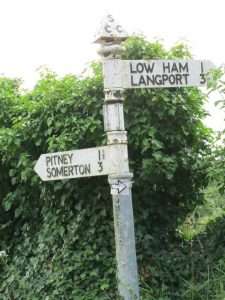Only today did I discover what it was all about:
The objects of the Society shall be:
The encouragement of Thrift, Self-help and Sobriety of Conduct in each individual member, and the promotion of a Spirit of True Comradeship, Friendliness and Brotherly Love towards all.
The Society shall provide charitable donations from its funds to local organisations which provide useful services to the community
Today was the day when the Langport Friendly Society held their annual walk, next Saturday, it will be Long Sutton. Long Sutton Parish Council describes the annual walk by their Friendly Society.
It used to hold its traditional Club walk on each Trinity Monday but changed from 1972 and is now held on the first Saturday in June and is one of a few of its kind still in existence.
The day starts with the church bells being rung at 6.00am and is followed by the annual roll call of Members at the Village Hall. The procession is headed by the Banner Bearer, Secretary, Chairman and President of the society followed by the band and then the members. Over the years the society has been supported by Kingsbury, Yeovil and in recent years Sherborne Town bands, one year though, in the 1990s, there was no band available and a Jazz band was asked to lead the members round.
The members’ parade from the hall to the church for their annual service, stopping outside the West Door for the National Anthem and then parading into Holy Trinity Church for the annual service, where music again is provided by the band. The banner with its motto ‘United we stand, divided we fall’ is draped across the altar during the service. The hymns selected are well known and, to hear a church full of men singing with a brass band, is quite an experience.
After the service the parade then reforms and the members set off on their walk calling at various houses and farms for refreshments of all kinds
I remember the excitement of club day arriving. The sun shone and there was a mood of happiness in the heart of a small boy. The club members, my uncle among them, wore dark suits and rosettes and were led by a silver band. The members of the club called for refreshments at various farms in the neighbourhood before gathering for lunch at the manor farm in the village.
Five years ago, a man in his nineties told me about the bits that I had forgotten.
“Townsends would bring their fair up from Weymouth. They were not allowed to set up on the village green until after the evening service at the church on the Sunday evening. On Monday morning, the club members would all meet at the church for a service and would then be led by the Kingsbury Episcopi Silver Band. It was Whitmonday, but must of the men were farm workers, so didn’t get bank holidays off work, club day was accepted as a day they did get off. The walk would visit the farms where one or other of them worked and the farmer would provide them all with a glass of beer or cider. There would be a good lunch at the end – and then a whip round to pay for it. Then there would be the fair in the evening.”
Our friendly society in Long Sutton, a small Somerset village, was aptly named, it was the embodiment of friendliness. The paucity of financial rewards from farm work was counterbalanced by a rich sense of community; club day cemented the day in the thoughts of members throughout the year.



